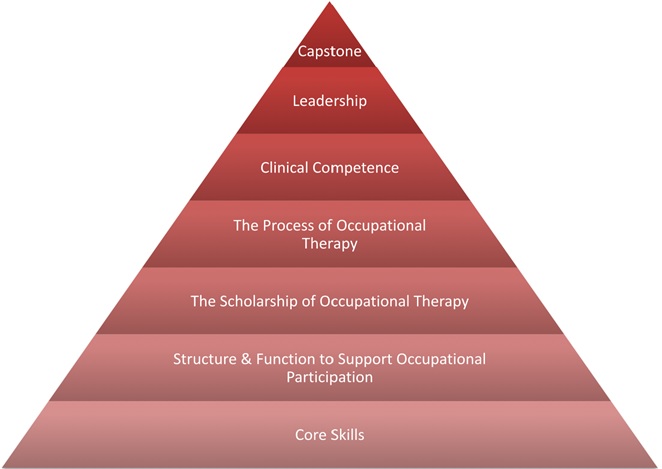
Curriculum Design
The Stony Brook University (SBU) Occupational Therapy Program is designed to educate entry-level occupational therapists whose skills and training will prepare them to practice competently in the rapidly-changing health care environment. In collaboration with the mission of SBU, its educational and clinical resources, and the needs of the community for a diverse workforce, students will be prepared to practice in entry-level settings. The program grants an Entry-Level OTD degree in Occupational Therapy and is approved by the New York State Department of Education and by the Accreditation Council for Occupational Therapy Education (ACOTE) of the American Occupational Therapy Association (AOTA). This program spans three years of full-time academic course integrated with clinical work.
The Occupational Therapy Program curriculum includes 112 credits for completion of the OTD degree with 24 of those as Level II Fieldwork. The enriched clinical education component includes several part-time experiences with clients and patients of all ages located in a variety of medical, educational, and community-based organizations, in addition to 6 months of full-time fieldwork. Initial coursework is supplemented and integrated with community service and students implement a 14-credit faculty mentored Capstone Residency in community or role emerging practice areas. Program outcomes are based on the development of knowledge learned, skills developed, and attitudes fostered by the student.
The occupational therapy program will allow you to:
- Enhance your critical thinking and develop clinical reasoning skills
- Participate in community service learning\
- Refine your understanding of culture and diversity and their role in developing effective professional relationships.
- Enhance clinical practice skills
- Develop skills to treat the whole person including physical, sensory, cognitive and psychosocial needs
- Use meaningful occupations to promote health and independence
- Focus on your individual professional growth and development as a lifelong learner
The curriculum is brought to life through our Curriculum Design. We view the implementation of the curriculum as a process of transformation in which our students and the faculty/Fieldwork Educators engage in exchanges of beliefs and values, priorities and expectations that are practical representations of two distinct cultures: the culture of the Occupational Therapy professional and the culture of the student. A process of amalgamation of the two traits occurs through the implementation of the curriculum in which students transform into Occupational Therapy professionals.
The scaffolding process is evident throughout the courses with learning enhanced each year students are in the program. All courses use a sequence of guided progressive assignments. The didactic nature of science and art courses are enhanced with skill development throughout all the threads of the curriculum. The design of the program builds upon the base skills needed to practice occupational therapy with a focus on the shift from didactic learning to clinical application. There are seven core curriculum threads that guide the natural development of the student through practicum and into a Doctor of Occupational Therapy. The core threads align with both the pillars of the mission and with the self-directed learning principles to promote societal well-being that are reflected in our educational philosophies.
The core skills strand of courses highlights the underlying skills needed the practice occupational therapy. Skills such as activity analysis, therapeutic relationship, and communication are developed through both lecture and laboratory experiences. The core skills courses provide students with a basic understanding of occupational therapy history and theory. These courses are foundational to understanding the process of occupational therapy, clinical competence, and leadership. Students also develop an understanding of the importance of evidence-based practice and develop basic skills that will facilitate selecting a capstone project.
Structure & Function to Support Occupational Participation
The courses within the structure & function to support occupational participation thread provide students with the fundamental knowledge for understanding how the body works. Students develop in-depth knowledge of anatomy, kinesiology, and neuroscience and how various conditions can impact the body. Education is aimed at developing an understanding of body structure and function to support occupational performance. The knowledge attained in these courses is elemental to being able to assess and treat individuals, groups, and populations.
The Scholarship of Occupational Therapy
The scholarship of occupational therapy thread courses provide future clinicians with an appreciation of and proficiency in evidence-based practice and basic research skills. This aspect of the curriculum prepares students to be able to make informed decisions throughout the process of occupational therapy and provides the technical skills required for both management and the capstone project.
The Process of Occupational Therapy
The process of occupational therapy thread is an integral component within the occupational therapy curriculum leading to the development of competent entry level occupational therapy practitioners. These skills require specific didactics with deliberate practice throughout the progressive sequence of courses. Students receive feedback from faculty, self and others through assignments such as case studies and simulated group protocols. Students enhance their learned skills by teaching others as evidenced through in class activities and presentations. Self-reflection and independent learning are stressed throughout the curriculum.
The clinical competence thread encompasses the fieldwork courses within the curriculum. Future clinicians participate in three level I and two-level II fieldwork experiences. They utilize their understanding of the core skills, structure and function of the body, scholarship, and process of occupational therapy in order to demonstrate entry-level clinical skills in two different occupational therapy settings.
Courses within the leadership thread prepare future occupational therapists for advanced roles within the profession. The courses within this curricular thread assist students in developing leadership skills, an understanding of management, and advocacy skills that facilitate a more advanced entry-level clinician. The skills and knowledge attained from these courses are critical for effective management of the capstone project.
The capstone thread includes all coursework that is directly related to the doctoral capstone project. Courses within this thread focus on preparation and selection of the capstone project, the capstone residency/experience, and dissemination of the capstone project. The completion of the capstone curricular thread, in addition to successful fieldwork, signifies that the individual is prepared as an entry-level doctoral clinician.

